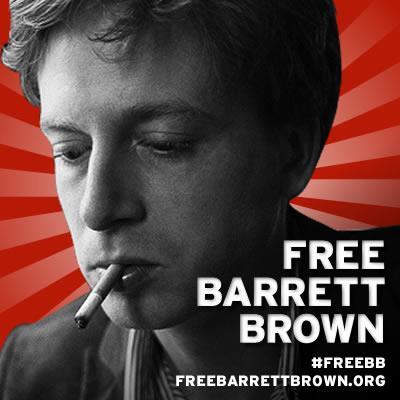US stops jailed activist Barrett Brown from discussing hacking prosecution
Federal court order prohibits Brown from talking to the media in what critics say is latest in crackdown on investigative journalism

Brown's lawyer says the gagging order is a breach of Brown's first amendment rights
A federal court in Dallas, Texas has imposed a gag order on the jailed activist-journalist Barrett Brown and his legal team that prevents them from talking to the media about his prosecution in which he faces up to 100 years in prison for alleged offences relating to his work exposing online surveillance.
The court order, imposed by the district court for the northern district of Texas at the request of the US government, prohibits the defendant and his defence team, as well as prosecutors, from making "any statement to members of any television, radio, newspaper, magazine, internet (including, but not limited to, bloggers), or other media organization about this case, other than matters of public interest."
It goes on to warn Brown and his lawyers that "no person covered by this order shall circumvent its effect by actions that indirectly, but deliberately, bring about a violation of this order".
According to Dell Cameron of Vice magazine, who attended the hearing, the government argued that the gag order was needed in order to protect Brown from prejudicing his right to a fair trial by making comments to reporters.
But media observers seen the hearing in the opposite light: as the latest in a succession of prosecutorial moves under the Obama administration to crack-down on investigative journalism, official leaking, hacking and online activism.
Brown's lead defence attorney, Ahmed Ghappour, has countered in court filings, the most recent of which was lodged with the court Wednesday, that the government's request for a gag order is unfounded as it is based on false accusations and misrepresentations.
The lawyer says the gagging order is a breach of Brown's first amendment rights as an author who continues to write from his prison cell on issues unconnected to his own case for the Guardian and other media outlets.
In his memo to the court for today's hearing, Ghappour writes that Brown's July article for the Guardian "contains no statements whatsoever about this trial, the charges underlying the indictment, the alleged acts underlying the three indictments against Mr Brown, or even facts arguably related to this prosecution."
The gag order does give Brown some room to carry on his journalistic work from prison. It says that he will be allowed to continue publishing articles on topics "not related to the counts on which he stands indicted".
Following the imposition of the order, Ghappour told the Guardian: "The defense's overriding concern is that Mr Brown continue to be able to exercise his first amendment right as a journalist. The order preserves that ability."
The lawyer adds that since the current defence team took over in May, Brown has made only three statements to the media, two of which where articles that did not concern his trial while the third ran no risk of tainting the jury pool. "Defendant believes that a gag order is unwarranted because there is no substantial, or even reasonable, likelihood of prejudice to a fair trial based on statements made by defendant or his counsel since May 1, 2013."
Brown, 32, was arrested in Dallas on 12 September last year and has been in prison ever since, charged with 17 counts that include threatening a federal agent, concealing evidence and disseminating stolen information. He faces a possible maximum sentence of 100 years in custody.
Before his arrest, Brown became known as a specialist writer on the US government's use of private military contractors and cybersecurity firms to conduct online snooping on the public. He was regularly quoted by the media as an expert on Anonymous, the loose affiliation of hackers that caused headaches for the US government and several corporate giants, and was frequently referred to as the group's spokesperson, though he says the connection was overblown.
In 2011, through the research site he set up called Project PM, he investigated thousands of emails that had been hacked by Anonymous from the computer system of a private security firm, HB Gary. His work helped to reveal that the firm had proposed a dark arts effort to besmirch the reputations of WikiLeaks supporters and prominent liberal journalists and activists including the Guardian's Glenn Greenwald.
In 2012, Brown similarly pored over millions of emails hacked by Anonymous from the private intelligence company Stratfor. It was during his work on the Stratfor hack that Brown committed his most serious offence, according to US prosecutors – he posted a link in a chat room that connected users to Stratfor documents that had been released online.
The released documents included a list of email addresses and credit card numbers belonging to Stratfor subscribers. For posting that link, Brown is accused of disseminating stolen information – a charge with media commentators have warned criminalises the very act of linking.
As Geoffrey King, Internet Advocacy Coordinator for the Committee to Protect Journalists, has put it, the Barrett Brown case "could criminalize the routine journalistic practice of linking to documents publicly available on the internet, which would seem to be protected by the first amendment to the US constitution under current doctrine".
In its motion to the Dallas district court, US prosecutors accuse Brown and his associates of having "solicited the services of the media or media-types to discuss his case" and of continuing to "manipulate the public through press and social media comments".
It further accuses Ghappour of "co-ordinating" and "approving" the use of the media, and alleges that between them they have spread "gross fabrications and substantially false recitations of facts and law which may harm both the government and the defence during jury selection".
But Ghappour in his legal response has pointed out that several of the specific accusations raised by the government are inaccurate. Prosecutors refer to an article in the Guardian by Greenwald published on 21 March 2013 based partly on an interview between the journalist and Brown, yet as Ghappour points out that piece was posted on the Guardian website before the accused's current legal team had been appointed.
Under his legal advice, Ghappour writes, Brown has maintained "radio silence" over his case and has given no further interviews, thus negating the government's case for a gagging order.

The press does not simply publish information about trials but guards against the miscarriage of justice by subjecting the police, prosecutors, and judicial processes to extensive public scrutiny and criticism
Legal proceedings surrounding the politically-charged, precedent-setting prosecution of investigative journalist Barrett L. Brown have taken another disconcerting turn as the government has requested a gag order to be placed on both Brown and his defense team.
Brown, who was arrested during a September 2012 raid on his Dallas apartment, is currently indicted on 17 felonies and has spent over 300 days in pre-trial federal detention. He potentially faces over a century in federal prison.
On Wednesday, September 4, a judge will decide whether or not the government will be permitted to prohibit Brown and his defense team from speaking to the press.
Among other charges, authorities have slapped him with multiple counts of credit card fraud, despite their showing zero evidence that he intended to profit from posting this information on his research wiki, Project PM. They have also charged him with threatening a federal officer.
Much has already been written about Brown and what led to his arrest, but perhaps the most shocking accusation leveled by federal prosecutors is that, in the course of Brown's research into and subsequent reporting on the murky world of private intelligence contractors, he pasted a link into an internet chat space that clicked through to emails hacked and leaked by Anonymous.
These emails, which incidentally contained unencrypted credit card information as well as other personal identifiers, were freed from the servers of the intelligence firm Stratfor.
Brown's case has rightfully become a rallying cry for journalists, information freedom activists and critics of prosecutorial overreach. Linking to source documents – like Brown's linking to the leaked Stratfor emails in the course of his research and reporting – has become critical journalistic practice. As Peter Ludlow writes in the Nation, “Brown’s case is a good—and under-reported—reminder of the considerable risk faced by reporters who report on leaks.”
The sheer number of years Brown faces in prison – over a century – starkly contrasts with the potential sentence the actual hacker faces: a maximum of 10 years.
Brown's satirical writing and razor-sharp political observations for magazines like Vanity Fair certainly helped build a following for the promising young journalist. It was Brown's fearless and uncompromising scrutiny of firms such as Stratfor and HBGary, however, that earned him the most respect and support, including from the late firebrand reporter Michael Hastings.
Hastings, the Rolling Stone writer whose expose led to the resignation of U.S. Gen. Stanley McChrystal from the head military post in Afghanistan, inked a 2012 Buzzfeed piece on Brown's arrest and was allegedly in the midst of a groundbreaking report before his tragic death on June 18 of this year, in which he may have included Brown as a source.

Why the Apparent Desperation?
The phrase “media gag order” in relation to United States v. Barrett Lancaster Brown is both too tame and slightly inaccurate, because the gag order is nothing less than the government's attempt to restrict Brown's free speech rights and impugn the professionalism of his highly-experienced defense team.
Indeed, it is just another part of an ongoing attack on Brown's ability to speak out against those who wield power with impunity: first, the corrupt contractors he targeted, and now a government hell-bent on burying the young journalist and scaring off those who might take his place.
It is not only a violation of free speech rights: it is ham-handed and, as I will point out, needless, as there are mechanisms already in place to prevent or at least mitigate the government's alleged concern that media coverage might derail any semblance of a “fair trial.” More on those mechanisms shortly.
On August 7, Assistant District Attorney Candina Heath filed a motion in Northern Texas' Fifth Circuit court requesting that Judge Sam A. Lindsey, among other things, “instruct [the defense team] to refrain from making 'any statement to members of any television, radio, newspaper, magazine, Internet (including, but not limited to, bloggers), or other media organizations about this case, other than matters of public record.”
Curiously, the prosecution makes a baseless, blanket accusation to bolster their not-so-humble request:
“Most of the publicity about Brown thus far contains gross fabrications and substantially false recitations of facts and law which may harm both the government and the defense during jury selection.”
They painstakingly proceed to detail every article either written by or about Brown since his pre-trial detention began, but fail to cite even one specific inaccuracy or “gross fabrication” that pisses them off – or, as they spin it, “might harm the jury selection process,” their purported motive for pushing a motion to gag trial participants.
There may be more at play here, however. Curiously, on July 16, the government filed a motion to “conditionally unseal” the sealed transcript of Brown's September 2012 bail hearing for the purpose of defense team's discovery.
Examining the document reveals that a protective order prohibits the release of this transcript to any party but the defense. The press and public, therefore, are kept in the dark about the precise allegations prosecutors made to deny Brown bail. Kevin Gallagher, the director of the advocacy group Free Barrett Brown, explained to me over email why the government may be keeping the proceedings under wraps:
“During a hearing after Barrett's arrest, the prosecution alleged in support of the idea that he was a danger to the community and a risk of flight, that he'd been to Tunisia, where Anonymous had assisted the revolutions there. Barrett has been to Tanzania, but never Tunisia in his life. I think they are sealing things to cover up for careless mistakes and false allegations like that," Gallagher attributed to a conversation with Brown's mother.
So it is certainly not a stretch to assume that the government's motion for a gag order is not just an attempt to control the public's perception of Brown's prosecution, but to cover up misconduct or prosecutorial mistakes. This then begs the question: what else might the prosecution want to bar from the press and public before and during Brown's trial, which is set to begin in 2014?

Media Gag Orders: Unconstitutional and Unnecessary
The Supreme Court has not yet ruled on the constitutionality of gag orders on trial participants (i.e. lawyers and their parties), so as it now stands, lower courts are left to rule on them as they see fit.
What's quite clear, however, is the fact that media gag orders are predicated on prior restraint and are undoubtedly content-based restrictions on speech. And on that notion, ladies and germs, the Court has ruled prior restraint unconstitutional, going so far as to state: “...prior restraints on speech...are the most serious and least tolerable infringement on First Amendment rights.”
The Supreme Court has ruled on gag orders placed solely on the press, and in 1976 it found in Nebraska Press Association v. Judge Hugh Stuart that court orders against pretrial publicity had to meet an exceedingly strict set of standards, chief among them being that if the numerous mechanisms in place to ensure impartial adjudication were insufficient, only then can a gag order strictly prohibiting media coverage proceed.
These safeguards, and thus alternatives, to gag orders have essentially been enshrined in our legal system since its inception. The measures include: changing a trial's venue, postponing until public attention recedes, interrogating potential jurors “to screen out those with fixed opinions as to guilt or innocence,” sequestration, and jury instruction on what may and may not be used to reach a verdict.
The Nebraska Press ruling beautifully upheld, above all else, First Amendment protections like freedom of the press.
So what about gag orders that extend not just to the press, but to lawyers themselves, as in the case of Barrett Brown?
Professor Erwin Chemerinsky argues in his wonderful essay for the Loyola of Los Angeles Entertainment Law Journal that these protections must extend to trial participants. “The imposition of these gag orders is based on several assumptions that are, at the very least, unproven and more likely untenable,” he writes.
“First is the assumption that publicity jeopardizes a fair trial,” continues Chemerinsky, who cites numerous examples, including the cases of Rodney King, Reginald Denny, the Menendez brothers, and the O.J. Simpson prosecution, in which there was rampant speculation that press attention would all but seal the defendants' fates. As we now know, publicity in these cases in fact had the opposite result. Flipping this around, it is difficult to see how pretrial publicity could endanger the government's case against Brown.
“Second, even if publicity is detrimental to a fair trial," he writes, "there is the assumption that statements by lawyers and parties cause or exacerbate the harm.”
Reviewing articles on Brown's case already in the public sphere, it is difficult to see how Brown's defense team has transgressed and endangered their client's case. As for Brown himself, what has he really done except tell his side of the story, i.e. the truth as he sees it? The government has every right to tell their side.
And, actually, wouldn't that be called a trial?
Attempting to prevent media coverage of proceedings doesn't act as a repellant. The fruit fly behavior of the press means they will likely be drawn to “juicier” stories, particularly ones where the government appears to be hiding things, and gag orders may increase the likelihood that inaccurate information is disseminated to the public. When you cut off contact with “the most knowledgeable individuals, the attorneys and parties in a case, the media must accept off-the-record statements or second- and third-hand accounts,” Chemerinsky correctly notes.
It is the government's burden to prove Barrett Brown guilty beyond a reasonable doubt, as it is to prove that violating First Amendment protections – in the face of built-in legal mechanisms, a defense team's spotless ethical record, and press coverage that has done little more than publish what is already public record – is warranted.

Chalking "Free Barrett Brown" and Janet Napolitano's UC police say lawsuit
Chalking "Free Barrett Brown", "Free Manning" (faded), "UC-DHS BE READY TO SHOW ID", etc on UC Berkeley campus, California the home of the free speech movement. After confirmation, the police that the UC has the right to sue for cost of clean up. One of Janet Napolitano's first acts as president of the UC system will be a lawsuit for chalking on UC campus property. Free Speech is not normal.

No comments:
Post a Comment
Note: Only a member of this blog may post a comment.